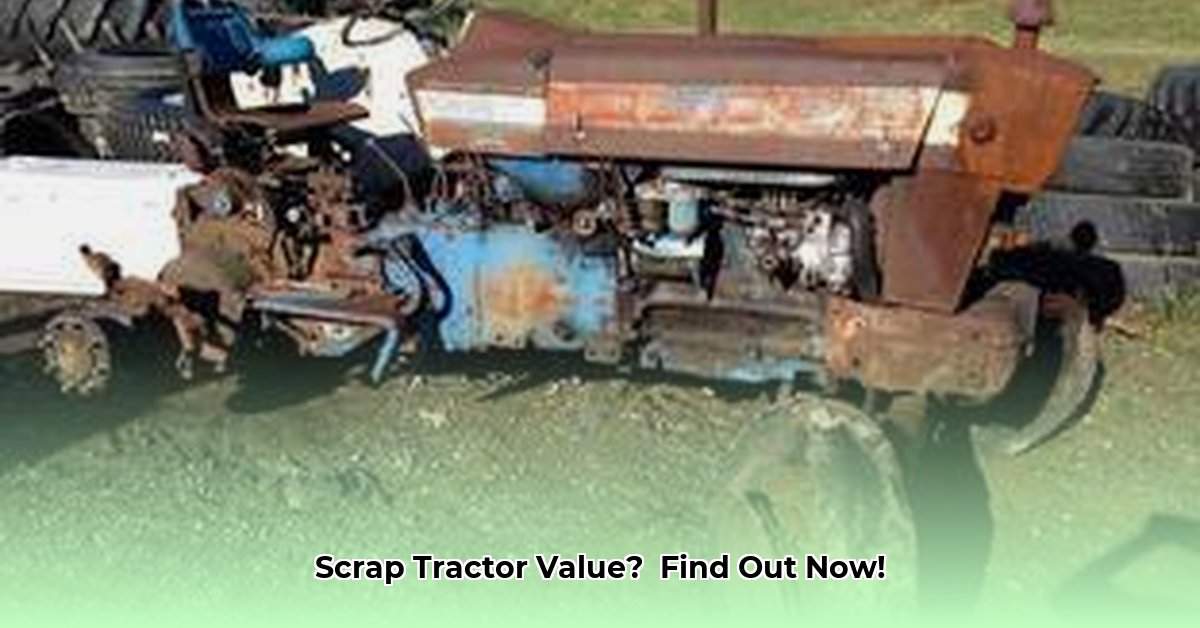
Assessing Your Tractor's Scrap Value
So, you're considering scrapping your old tractor? Before you call a scrap yard, understanding its potential scrap value is key to maximizing your return. Several factors influence this value:
Weight: The heavier the tractor, the more scrap metal it contains, directly impacting its value. A 5,000-pound tractor will generally yield more than a 2,000-pound one.
Metal Composition: Steel is the primary component, but the presence of other metals like aluminum or copper increases the overall value. Scrap yards often pay different rates for different metals.
Condition: While a non-functional tractor still has scrap value, its condition affects the price. A relatively intact tractor, even if not running, will fetch more than one severely damaged or heavily rusted.
Location: Scrap metal prices fluctuate geographically. Factors influencing this include local supply and demand, transportation costs, and proximity to recycling facilities. Shop around for the best offer!
For up-to-date market values, check out this helpful tractor valuation resource.
Getting the Best Price from Scrap Yards
Calling multiple scrap yards is crucial. Don't settle for the first offer. Ask these key questions:
- Weighing Process: How do they determine the weight of the tractor? Some use scales, others estimate. Are there fees associated with dismantling or preparation?
- Pricing Structure: Do they pay differently for different metals? Inquire about their per-pound rates for various metals (steel, aluminum, copper, etc.).
- Hidden Fees: Ask about any additional charges – pickup fees, fluid removal costs (oil, coolant), and tire disposal fees.
This comparison shopping ensures you get the most competitive price for your tractor's scrap metal. Remember that scrap metal prices fluctuate daily based on market conditions.
Resale vs. Scrap: Weighing Your Options
Before scrapping, consider if reselling your tractor (or its parts) might be more profitable.
Resale Advantages:
- Higher Potential Return: Reselling (whole or parts) could significantly exceed scrap value, especially for tractors in good condition or with valuable parts.
- Environmental Benefit: Resale extends the tractor's lifespan, reducing its environmental impact compared to immediate scrapping.
Resale Disadvantages:
- Time and Effort: Selling requires advertising, showing the tractor, negotiating, and handling paperwork.
- Market Uncertainty: Finding a buyer at your desired price is not guaranteed.
Scrap Advantages:
- Guaranteed Payment: You receive a guaranteed payment for the scrap value, eliminating the uncertainty of resale.
- Speed and Simplicity: Scrapping is significantly quicker and easier than selling.
Scrap Disadvantages:
- Lower Return: Scrap value always falls short of potential resale value, especially for tractors in good condition.
A Real-World Example: Resale vs. Scrap
Imagine a 5,000-pound tractor. A scrap yard might offer $100-$200. However, if it's in decent shape, it could fetch $2,000-$5,000 on the resale market – a considerable difference! This underscores the importance of exploring both options.
Maximizing Resale Value (If Applicable)
If resale is a viable option, maximizing its value requires preparation:
- Thorough Cleaning: A clean tractor is vastly more appealing to potential buyers. Pressure washing and paint touch-ups enhance its presentation.
- Mechanical Assessment & Repairs: Addressing minor mechanical issues significantly improves its attractiveness and saleability. Small repairs can have a large impact.
- Documentation: Compile all relevant paperwork – manuals, service records, and purchase history – building buyer confidence.
Choosing the Right Sales Channel (If Applicable)
Several avenues exist for selling your tractor:
- Private Sale: Offers the highest potential return but requires more time and effort in marketing and managing the sale.
- Online Marketplaces (e.g., TractorHouse, eBay): Provide wider reach but involve more competition and potential scams.
- Dealer Trade-in: The most convenient option, although often offering the lowest return.
Carefully weigh the pros and cons of each option based on your time constraints and desired return.
Parts Resale: Unlocking Hidden Value
Don't overlook the potential of selling individual parts. Many farm equipment components (engines, transmissions, hydraulic pumps) retain value even when the tractor itself is considered scrap. A systematic assessment of reusable parts can boost your overall earnings significantly.
Key Takeaways
- Thoroughly assess your tractor's condition.
- Obtain multiple quotes from scrap yards.
- Carefully weigh the pros and cons of scrapping versus reselling (or selling parts).
- Prepare your tractor for resale if that option is chosen, focusing on cleaning, minor repairs, and comprehensive documentation.
- Research current market values for comparable equipment.
- Consider all available sales channels (private sale, online marketplaces, dealer trade-in).
- Don't underestimate the value of selling individual parts.
By following these steps, you can make an informed decision that maximizes your financial return from your old tractor, whether through scrapping or resale.